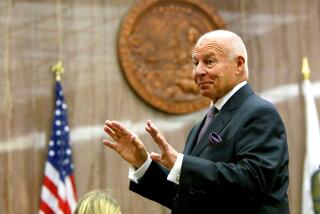J. David Lawyers Were Secretly Probing Firm
- Share via
SAN DIEGO — Rogers & Wells, the law firm that represented fraud-ridden J. David & Co., conducted a secret, internal investigation of J. David in early 1983 because it suspected the La Jolla investment firm of running a “Ponzi scheme” and wanted to know if any of its attorneys were participating in the scheme, according to confidential Rogers & Wells documents obtained Friday by The Times.
The focus of the “special investigation” was to discover if J. David (Jerry) Dominelli was merely telling Rogers & Wells officials “what (he) believes we want to hear rather than what is actually the fact,” according to a confidential memo written by San Diego partner-in-charge Mitchell L. Lathrop to two colleagues on Jan. 23, 1983--a little more than a year before Dominelli’s firm was forced into bankruptcy.
In addition, Lathrop wrote that he wanted to know “whether or not another senior individual in the firm is either knowingly or unknowingly aiding such an effort.”
Costs of the secret investigation were charged to the firm’s J. David & Co. client account. However, Lathrop wrote that he had created a new account, titled “Special Client Relations Account,” to be used by his colleagues during the investigation “should you wish to have any time or expenses undisclosed.”
Lathrop’s memo was written two days after a Rogers & Wells partner in London urged the firm’s local office to tell Dominelli to “cease trading” his foreign currency, or “Interbank,” accounts and to refund clients’ money because he was selling unregistered and illegal securities.
Lathrop could not be reached for comment Friday.
Although the firm’s local partners apparently never made that recommendation to Dominelli, they did inform him, in a four-page memo dated Feb. 2, 1983, that his interbank activity should be registered as a security.
However, the next day, Rogers & Wells attorney Don Augustine, who had written the memo, met with the corporate counsel for the state Department of Corporations to discuss the state’s investigation of J. David. He argued that Dominelli’s interbank did not constitute a security and the state, relying on Augustine’s representations, decided to drop its J. David investigation.
Had state investigators required Dominelli to register his interbank in early 1983, then they might have quashed the J. David scheme before it mushroomed over the next 12 months. The majority of the $200 million that was lured from J. David’s 1,500 clients was invested in the firm after the Department of Corporations dropped its investigation.
Two weeks later, on Feb. 17, Rogers & Wells attorney Richard Annen, who helped lead the internal investigation, wrote in a memo that “how are we as attorneys to understand how (the J. David & Co. bank in Montserrat) works if the only information which we get is that information which (J. David executive Mark Yarry) and Dominelli have decided is appropriate for us to disclose (to the state)?”
In an earlier meeting, according to Annen’s memo, Dominelli was asked how he would respond if the state asked if J. David & Co. were a Ponzi scheme, where new investor money is used to pay off existing clients.
“Dominelli was basically unable to frame an answer to the question,” Annen wrote.
The outcome of Rogers & Wells’ internal investigation is unknown; the firm officially resigned from J. David’s interbank activity on June 2, 1983, although it continued to represent the firm in other areas.
However, Rogers & Wells attorney Norman Nouskajian continued to work extensively on interbank activity, according to both former J. David executives and to the numerous civil lawsuits that have been filed against Rogers & Wells by more than 300 former J. David investors.
The law firm now is reportedly pondering whether to fight the lawsuits or to settle them out of court, according to sources familiar with the cases.
Nouskajian was put on an unpaid leave of absence from the law firm in April, 1984, and resigned last July.
Dominelli was sentenced in June to 20 years in federal prison after pleading guilty to three counts of fraud and one count of income tax evasion.
A federal grand jury is still investigating J. David & Co., as well as several people once connected to the firm.
More to Read
Inside the business of entertainment
The Wide Shot brings you news, analysis and insights on everything from streaming wars to production — and what it all means for the future.
You may occasionally receive promotional content from the Los Angeles Times.










